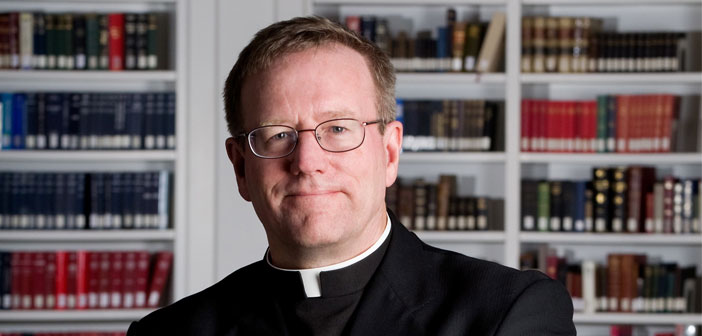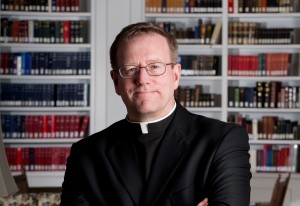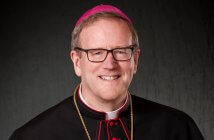By Rev. Robert Barron
Father Robert Barron is the founder of the global ministry, Word on Fire, and the Francis Cardinal George Professor of Faith and Culture at University of St. Mary of the Lake in Mundelein. He is the creator of a new ten episode documentary series called “Catholicism” airing on PBS stations and EWTN. Learn more about the series at www.CatholicismSeries.comThe Church has just celebrated one of the most important days on the liturgical calendar, the feast of Pentecost, the feast of the Holy Spirit. There are three great symbols classically associated with the third Person of the Trinity, namely, water, fire, and wind; and each of these has a negative connotation, for the Holy Spirit is dangerous.
All of us who witnessed the destruction wreaked by Hurricane Katrina six years ago can testify to the devastating punch that water can pack. A major American city was brought to its knees by the inundation that came from the skies, from the sea, and from reservoirs that poured through broken levees. As I write these words, the second most destructive wildfire in the state’s history is raging in Arizona. Hundreds of square miles of vegetation have been destroyed and several towns threatened by this blaze which is now twice the area of the city of Chicago. Though firefighters take some action, there is little they can do to corral a conflagration of this magnitude. Two months ago, a number of towns in the deep south were obliterated by tornadoes, and just two weeks ago in Joplin, Missouri, a tornado had the effect of a blockbuster bomb, leveling homes, businesses, and a major hospital. In the wake of such events, can anyone doubt the sheer power of wind?
Please don’t misunderstand me: I’m not suggesting for a moment that these events are the punitive work of the Holy Spirit. But I am indeed suggesting that the Holy Spirit is like water, wind, and fire in his power to uproot, turn over, clean out, obliterate, and flatten. As Fr. Anthony Lobo, the rector of Theological College in Washington, put it in a sermon I heard in 1980, “the love of God is not a warm fuzzy!” There are things that stand in opposition to God, and they are the targets of the Holy Spirit’s fury. Mind you, the destruction caused by the Spirit is always for good, for it is always a preparation for re-building, re-configuring, and renewal. But this knowledge doesn’t make the process of cleansing any less painful and disconcerting.
I believe that we can see this aspect of the Holy Spirit’s activity on very clear display today in the life of the church. As I have argued often, we are passing through the worst crisis in the history of the Catholic church in America. The outrages of anti-Catholic Know-Nothings in the 19th century were nothing compared to the self-imposed agony of the clergy sex-abuse scandal, which continues seriously to undermine the credibility of the church and to compromise its work in almost every way. Because of these terrible crimes against the most vulnerable, the church is being compelled to endure a period of very painful purification. The great fire of the Holy Spirit is burning some things away; the great wind of the Holy Spirit is knocking some things down; and the mighty water of the Holy Spirit is washing some things away. Are forces opposed to the church active in this process? Sure. In the Old Testament, Yahweh often turned Israel over to its enemies in order to accomplish his chastising and purifying purpose.
But the Holy Spirit does not have simply this negative effect. To understand the positive dimension of the Spirit’s influence, return to those same three great symbols. Water can be destructive to be sure, but water is also the source of life everywhere on the planet; fire can be devastating of course; but fire is also the foundation for all of our technology; wind can indeed have the effect of a bomb, but it is also capable of lifting a giant aircraft off the ground. Properly harnessed, in other words, those three natural forces can power and energize an entire civilization. St. Paul often reflected on the wonderfully variegated effects of the one Spirit. In first Corinthians he says: “There is a variety of gifts but always the same Spirit; there are all sorts of service to be done, but always to the same Lord; working in all sorts of different ways in different people, it is the same God who is working in all of them” (1 Cor. 12: 4-7). The single element of water gives rise to millions of species of plants, flowers, and trees; the one force of electricity powers millions of machines, devices, and lights; and one and the same wind lifts countless airplanes. So the one Holy Spirit animates the diverse ministries within the Church: administration, teaching, preaching, liturgy, formation of the young, service to the poor, praying for the living and the dead, visiting and caring for the sick, etc.
And just as we cooperate with the Holy Spirit in his work of cleansing (even if that means simply enduring it in faith), so we must cooperate with the Spirit’s work of re-building and renewing. We do this by discovering in prayer which ministry is ours, which charism of the Spirit has been given to us. Not one baptized Catholic is permitted to sit this one out! If we want to be part of the solution to the greatest crisis in our history, we have to respond to the promptings of the Holy Spirit and get to work. We have to allow the Wind to blow through us, the Water to flow out of us, and the Fire to burn in us.
By Rev. Robert Barron
Father Robert Barron is the founder of the global ministry, Word on Fire, and the Francis Cardinal George Professor of Faith and Culture at University of St. Mary of the Lake in Mundelein. He is the creator and host of a new ten episode documentary series called “Catholicism” and also hosts programs on Relevant Radio, EWTN and at www.WordOnFire.org.




